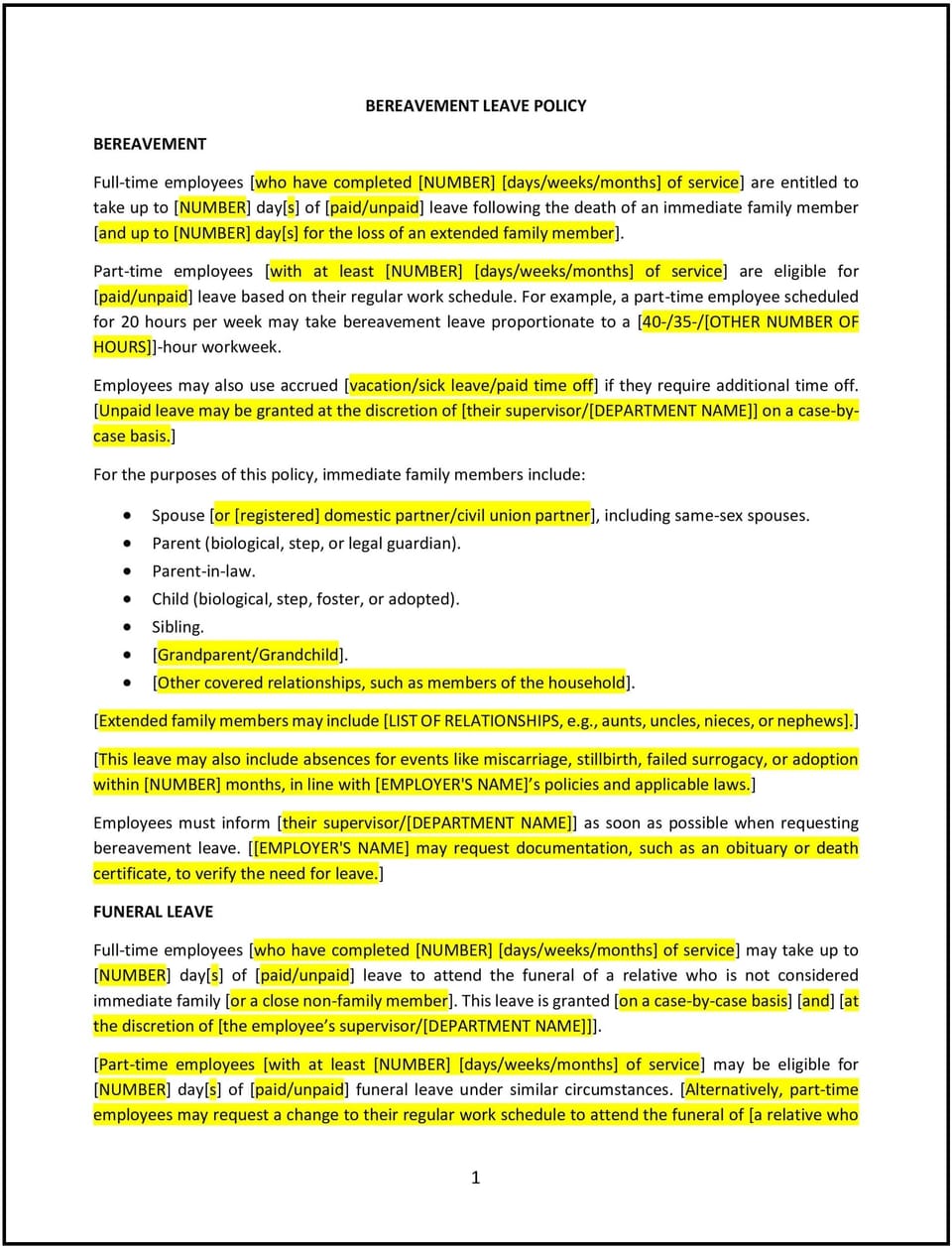Bereavement leave policy (Idaho): Free template

Bereavement leave policy (Idaho)
A bereavement leave policy helps Idaho businesses provide employees with time off to grieve and manage personal matters following the death of a close family member or loved one. This policy outlines the eligibility criteria, duration of leave, and procedures for requesting time off. It reflects the business’s commitment to supporting employees during difficult times while maintaining operational continuity.
By implementing this policy, businesses can demonstrate empathy, foster employee well-being, and build a supportive workplace culture.
How to use this bereavement leave policy (Idaho)
- Define eligibility: Specify which employees are eligible for bereavement leave, such as full-time, part-time, or temporary workers. Clarify any waiting periods or tenure requirements.
- Outline leave duration: State the number of days provided for bereavement leave, typically ranging from 1 to 5 days, depending on the relationship to the deceased.
- Include covered relationships: List the relationships that qualify for bereavement leave, such as immediate family members (spouse, children, parents, siblings) and, if applicable, extended family or close friends.
- Establish request procedures: Provide clear instructions for requesting bereavement leave, including whom to notify, required documentation, and advance notice expectations (if applicable).
- Address paid vs. unpaid leave: Specify whether bereavement leave is paid or unpaid, aligning with the business’s resources and practices.
- Communicate expectations: Ensure employees understand their responsibilities, such as notifying their supervisor as soon as possible and coordinating their workload before taking leave.
- Review and update: Regularly review the policy to ensure it remains aligned with employee needs, business operations, and any changes in Idaho labor laws.
Benefits of using this bereavement leave policy (Idaho)
This policy provides numerous benefits for Idaho businesses:
- Supports employee well-being: Providing time off to grieve helps employees manage personal matters and return to work with greater focus and emotional stability.
- Demonstrates empathy: A bereavement leave policy shows employees that the business values their personal lives and cares about their mental and emotional health.
- Enhances workplace culture: By supporting employees during difficult times, businesses can foster a compassionate and inclusive workplace environment.
- Improves employee retention: A supportive policy can increase employee loyalty and reduce turnover by demonstrating the business’s commitment to its workforce.
- Maintains productivity: Clear guidelines for bereavement leave help minimize disruptions and ensure smooth operations during an employee’s absence.
- Aligns with best practices: Offering bereavement leave reflects modern workplace standards and can improve the business’s reputation among employees and job seekers.
- Provides clarity: A well-defined policy ensures consistent treatment of all employees and reduces potential misunderstandings.
Tips for using this bereavement leave policy (Idaho)
- Communicate the policy effectively: Share the policy with employees during onboarding, training sessions, and through internal communications to ensure awareness.
- Train managers: Ensure supervisors understand the policy and are equipped to handle bereavement leave requests with sensitivity and professionalism.
- Offer flexibility: Consider allowing additional unpaid leave or flexible work arrangements for employees who need more time to grieve.
- Document requests: Maintain records of bereavement leave requests and approvals to ensure consistency and transparency.
- Provide resources: Offer access to counseling services or employee assistance programs (EAPs) to support employees during their grieving process.
- Review the policy regularly: Update the policy as needed to reflect changes in employee needs, business operations, or Idaho labor laws.
- Lead with empathy: Encourage a workplace culture where employees feel comfortable discussing their needs and seeking support.
Q: Why should Idaho businesses have a bereavement leave policy?
A: A bereavement leave policy helps businesses support employees during difficult times, demonstrating empathy and fostering a positive workplace culture.
Q: Who is eligible for bereavement leave under this policy?
A: Eligibility typically includes full-time and part-time employees, though specific criteria may vary based on the business’s practices.
Q: How many days of bereavement leave are provided?
A: The policy typically provides 1 to 5 days of leave, depending on the employee’s relationship to the deceased.
Q: Which relationships qualify for bereavement leave?
A: Immediate family members, such as spouses, children, parents, and siblings, are usually covered. Some policies may extend to extended family or close friends.
Q: Is bereavement leave paid or unpaid?
A: This depends on the business’s practices. The policy should clearly state whether leave is paid or unpaid.
Q: How should employees request bereavement leave?
A: Employees should notify their supervisor as soon as possible and follow the procedures outlined in the policy, which may include submitting a request form or providing documentation.
Q: Can employees take additional time off if needed?
A: Some businesses allow additional unpaid leave or flexible work arrangements, depending on the circumstances and the employee’s needs.
Q: How often should the policy be reviewed?
A: The policy should be reviewed annually or as needed to reflect changes in employee needs, business operations, or Idaho labor laws.
This article contains general legal information and does not contain legal advice. Cobrief is not a law firm or a substitute for an attorney or law firm. The law is complex and changes often. For legal advice, please ask a lawyer.


